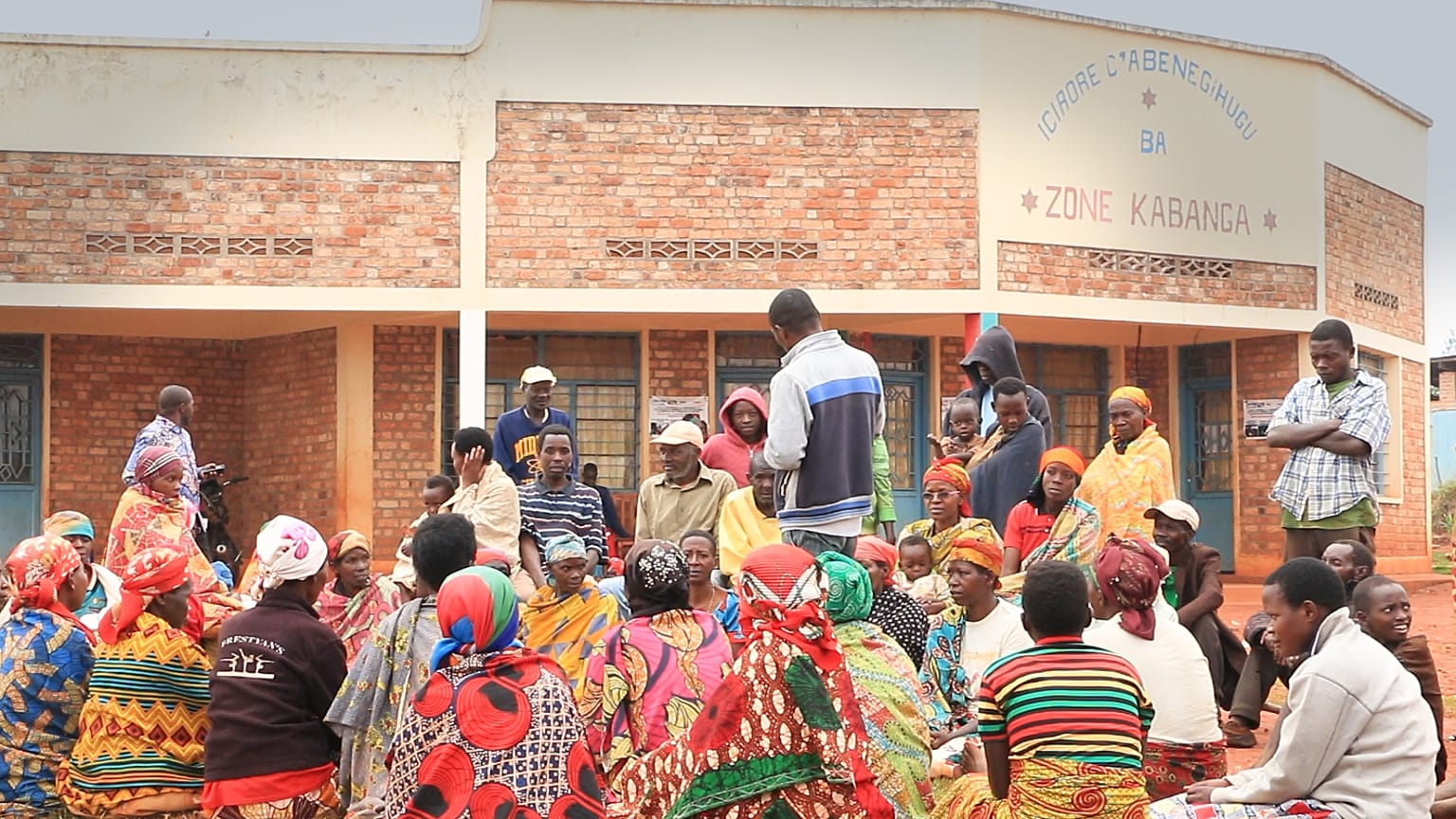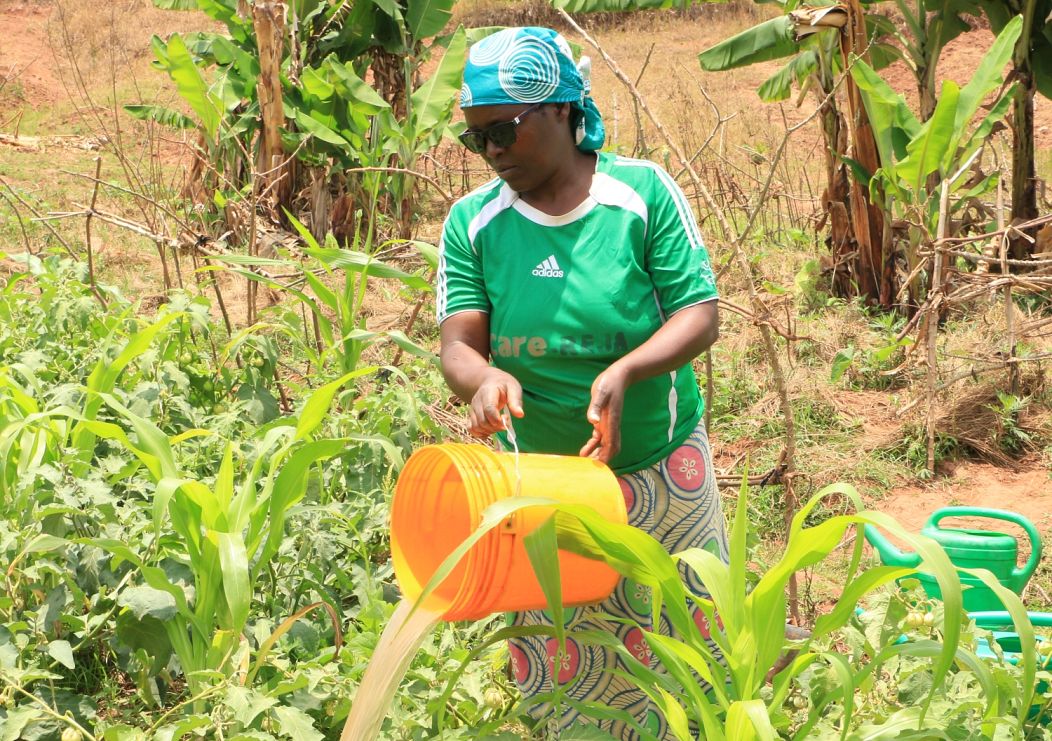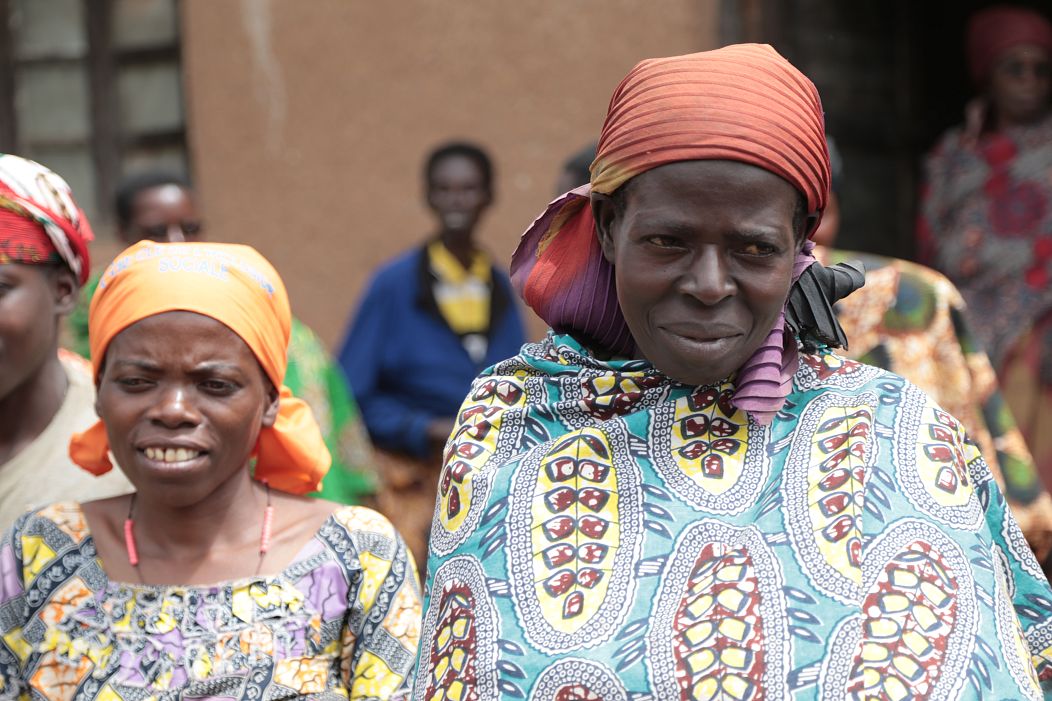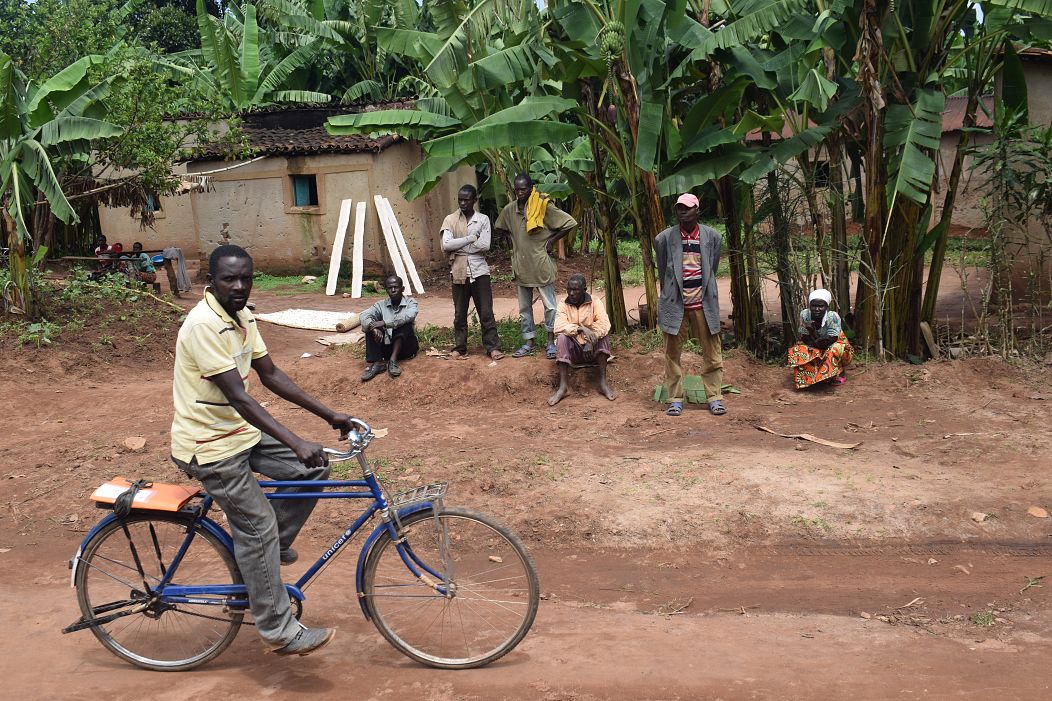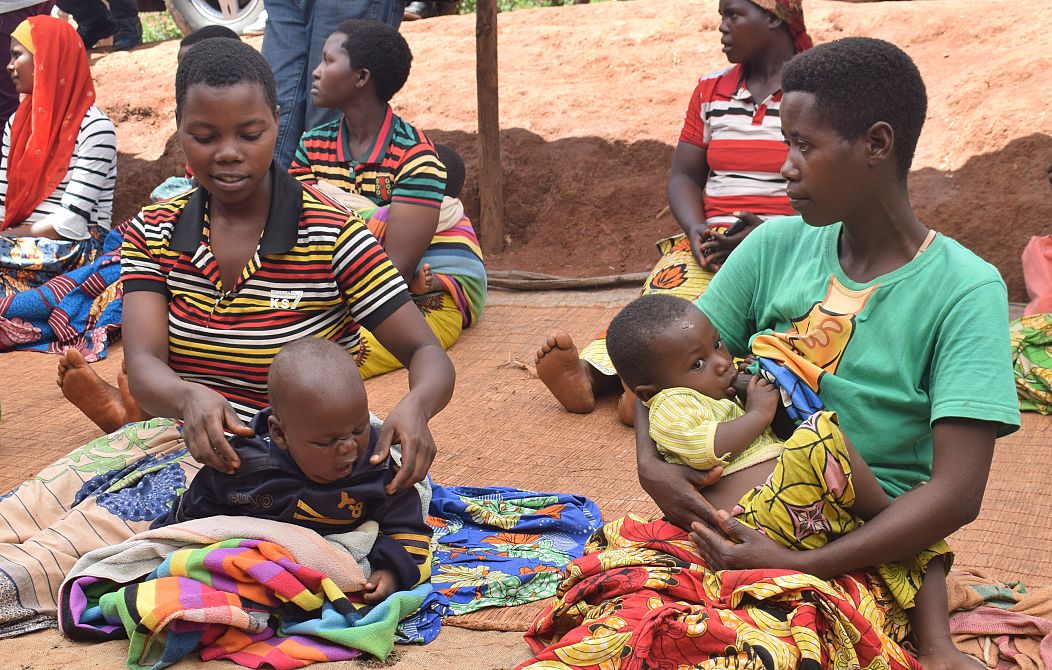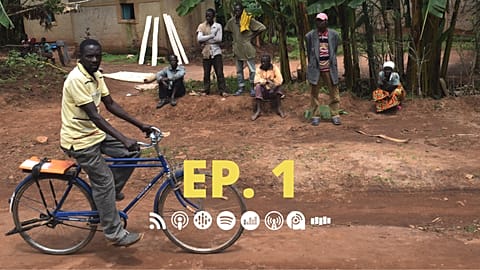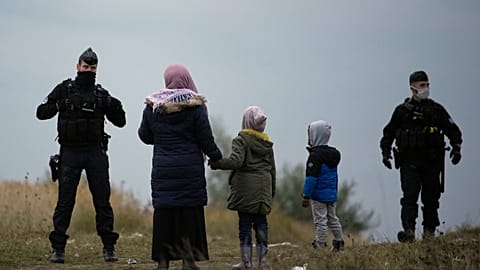Tradition holds a lot of importance in many Burundian families. But these men learned that some customs are making their lives miserable, and that they need to change.
“Umukenyezi”. That’s a word Burundian men usually use to describe their ideal woman: “the one who ties her loincloth on thorns and walks without flinching and without the outside world noticing her pain”, as it literally translates from the local language Kirundi.
 ADVERTISEMENT
ADVERTISEMENT
 ADVERTISEMENT
ADVERTISEMENT
It serves them as a metaphor of what they expect from a wife: a woman who carries the burden of marriage with her head held high and her mouth shut.
And the husband is supposed to be an “umushingantahe”, or “the one who embodies power, respect and value”.
These are not only words. Without a man by her side, a Burundian woman, who by law has no right to inherit property, can turn into an outcast with nowhere to live. Yet having a husband is no guarantee of a happy life either: domestic violence is a scourge in this small East African country.
But some couples have decided these terms no longer define them.
One man who stopped beating his wife
“He calls me darling. In the past, he couldn’t even say my name.”
Leoncie Nduwimana talks about her husband, Faustin Ntiranyibagira, with an unmistakable tenderness in her voice.
“Today I’m his darling.”
The couple married in 1995 and they have five children. When Faustin, 50, and Leoncie, 42, get home exhausted after a hard day of work, they share the housework. It may not be an ideal 50/50, but the mere fact surprises their neighbours.
She is not umukenyezi and he is not umushingantahe, but they are an example in their community in Colline Kiremera, a small village in the central plateau of the country.
But 10 years ago when they had only just married, things were very different. Leoncie met Faustin, a farmer, in church and quite quickly fell in love.
“I liked that he played guitar,” she recalls.
They got married, but three months into their marriage, Faustin turned from her prince charming into a raging abuser.
“He made me suffer all the torments that exist,” says Leoncie.
The family was falling apart. Leoncie was doing all the hard work around the house and in the fields. Faustin, who was in charge of the family budget, wasted all the money.
“He didn’t buy me clothes, he didn’t give me food. He beat me. He didn’t help me, I was the only one working,” says Leoncie, recalling the extreme poverty that they lived in at the time.
“I was unhappy. I was growing older by the day because of all the worries.”
Faustin openly admits he used to beat his wife. As he tells us his part of the story they sit next to each other outside their house. She chuckles at his exuberant self-critical jokes and corrects him when he forgets important details.
“I had a lot of problems because of the traits that I saw in my father. Our dad was mean. He beat my mother and splurged our family’s money,” says Faustin.
“I put up with it. I believed that being a man is a privilege to be powerful, a king, an authority. And I wanted to have a wife not to build a home but to have authority over her like my father did.”
His friends in the village thought similarly. The men would get together to encourage each other “to enforce respect” on their wives.
“I had friends who told me that a man who dares to smile at his wife, a man who helps his wife do the work is a submissive man," Faustin recalls, adding that he, like Leoncie, wasn’t happy.
“Our house was messy, there was noise all the time. We were unhappy. I was so poor that I once begged to lend me a bicycle to take my wife to the hospital, but they refused, treating me as less than nothing,” he remembers.
The way Faustin and his friends treated their wives is far from unique in the communities in Burundi.
Then one day, CARE International, a humanitarian organisation focused on sustainable development, organised a meeting in the village. The year was 2006. CARE had been operating in the area for a couple of years, giving out a goat to every two families to help them out of poverty. Faustin says that by that time the organisation had given out as many as 426 goats, but the villagers had sold all of the goats for a quick fix.
“That day I showed up thinking they would give me money,” he laughs.
“I was disappointed."
Instead of goats, CARE brought to the meeting a man named Salvator who told the villagers the story of his marriage. Of how his life changed when he decided to stop beating his wife and start helping her instead.
"CARE had been thinking about how to change us. That's how they got the idea of supporting women through men because it is men who commit abuse,” says Faustin.
At first, he thought Salvator was a pushover. “But once I got home, I wanted to try. The next day, I took a jerry can and went to fetch water,” he remembers.
“My neighbour said that my wife bewitched me but I continued to help her with the housework. She started to give me a warm welcome. That's when I realised that she is happy when I am like this.”
“When he came back, he brought me vaseline as a present. At first, I couldn’t believe it, I thought he was dying, because it’s before death that people do nice things,” laughs Leoncie.
Faustin finally saw his wife as an equal partner and with time they became one of the wealthiest households in the area.
Today Leoncie spends her days working in the cornfield and running a small shop where she sells rice, beans and other groceries. Every day Faustin takes her to work on his bike. He recalls that right after she started working, she was able to buy a goat right away.
“I would never be able to do that,” he says with pride.
Faustin works alongside his wife in the fields and helps other men like him. They call themselves the Abatangamuco, or “those who shine light” in Kirundi.
Harmful traditional norms
Burundi, a landlocked country in East Africa with 11 million inhabitants, has one of the highest rates of domestic violence in the world. According to a 2017 government report, 48.5 percent of Burundian women have experienced physical or sexual abuse at the hands of their partner.
There are no open-source nationwide statistics on gender-based violence, but different NGOs collect their own data in the areas where they operate.
Centre Seruka, for example, covering three out of the 18 provinces, recorded 597 cases of rape in the first half of 2020. The organisation records about 101 cases of gender-based violence a month.
According to local activists, these figures don’t show the real picture.
“The problem is covered with total silence. A beaten woman, who presents with signs of redness on her face, will not dare to tell those around her that she was beaten by her husband. She will say that she hit a wall,” says Christine Ntahe, a prominent Burundian activist involved in resolution of domestic conflicts, known in the country as “Maman Dimanche”, the French for Mother Sunday. She is called that because every Sunday outside of her apartment, she organizes lunches for underprivileged children.
Burundi is one of the most densely populated countries in the African Great Lakes region. According to the “Third Demographic and Health Survey” carried out by the government in 2016 and 2017, on average every woman gives birth to six children.
In 2015 the World Bank named Burundi as the poorest African country. In 2019 it came second after South Sudan. Last year, 80 percent of the population worked in agriculture, earning an average of US$260 per capita. According to NGOs, poverty and established cultural norms contribute to high numbers of cases of gender-based violence.
“Burundian society is a patriarchal society and gender equality is not yet there,” says Jean Nimubona, a regional officer for CARE International.
“It is a society where we still see male domination. Men dominate in decision making, in the management of household assets.”
“The division of labour is not equitable. The woman takes care of the household. It is the man who is the breadwinner, he is the only one who earns money, except in the more educated milieu.”
A huge contributing factor to gender inequality is access to education for women. In 2020 the World Bank put Burundi at 131 out of 135 countries in terms of the educational attainment gap. According to the Institute of Statistics and Economic Studies of Burundi, in 2017 the literacy rate for men was 79 percent against 68 percent for women.
“Girls were not initially seen as those who could have diplomas. A diploma for the girl was a husband,” says Ntahe.
“Burundian women are really not educated. And that means they don't even know their rights because they only believe in their culture,” agrees Grace Francoise Nibizi, director of SaCoDe, a local NGO promoting gender equality and fighting stigma around menstruation.
She says that illiteracy and adherence to traditional gender roles strongly affect women, whose lives can be deprived even when their families are well-off.
“We are in 2020 in Burundi and women and girls cannot inherit. When we did a study, we realised that the majority of people who are against the change of law were women. And for me, those women were against it because they could not think deeply and widely to see the consequences of not being able to inherit,” Nibizi says.
“They just believe that the cultural norms are right and some of these norms are very harmful,” she adds.
In 2016 the government adopted a law enforcing punishment against abusers. The law aims to prevent gender-based violence and punish perpetrators. According to the new legislation, gender-based crimes must be examined in a special court with specialized judges and lawyers.
“It’s a big step for Burundi in the struggle against gender-based violence,” says Donatienne Girukwishaka, head of promotion of women and gender equality at the ministry of human rights, social affairs and gender, stressing that Burundi is one of the first countries to have adopted such a law in the Great Lakes region.
However, experts warn that women's economic vulnerability, ignorance of the law and the lack of effective victim and witness protection make the law hard to enforce.
One man who changed thousands
Faustin believes that the key to achieving gender equality and prosperity in his country is to educate the men about the problem and make them “shine light”.
“To change others, a member of the Abatangamuco starts with his own testimony accompanied by sketches based on real experiences. This is our main approach,” says Faustin, who started the Abatangamuco along with seven other men in 2010.
“He starts by testifying in his neighbourhood, showing people who knew him well how he has changed. This is what helps others to change easily.”
Today the movement consists of more than 8,000 men and their families. It is difficult to measure their real impact on communities and the real number of members, but according to CARE, which supports the group, their approach is so effective that over the years only four men have decided to quit the programme. And the community members see the difference.
“Many of my neighbours have changed. They used to beat and drive their wives from home, but they don’t any more, thanks to the Abatangamuco,” says Joseph Itangishaka, a man in his 40s from Colline Kiremera, who attended one of their meetings.
The approach is effective because it doesn’t require a lot of resources, says Nimubona from CARE.
“There are no other approaches that can change people's lives without external inputs. It's all about seeing and listening, which allows people to identify with them,” he says.
“Their approach touches the community members at the grassroots, it touches the poor people and the wealthy ones.”
For men in rural areas, one of the strongest incentives to change their ideas about masculinity is the desire to get out of poverty, says Nimubona.
“The husband, the man, who is the sole manager of the family income often splurges the money. And it's only when the man realises that he is the one causing a lot of problems in the household, he starts to change his behaviour”, he says.
To get the message across, the Abatangamuco work with relevant human rights NGOs. They also work closely with churches and local government on issues such as protecting children and people with disabilities.
Theatrical performances, personal testimonies and individual consultations are some of the tools they use.
“They also take advantage of official ceremonies and weddings,” adds Nimubona.
In the provinces where they operate, the Abatangamuco have created decentralised committees down to the level of villages, known as collines, which means “hills” in French.
“The way local governments support the movement shows how much confidence people have in their approach to work, so I think it's not a movement that is doomed to disappear, it's a movement that is rising,” says Nimubona.
“The movement works because it is a movement that talks about sensitive issues at the community level. Domestic violence, gender-based violence, even land conflicts."
The success of the Abatangamuco network is recognised by the Burundian government. Last year, Martin Nivyabandi, then the minister of human rights, social affairs and gender, awarded Faustin a certificate of honour as a man who was able to combat gender-based violence. According to Faustin, the authorities invite the group to official ceremonies to teach and give advice.
Today, the Abatangamuco operates in nine out of Burundi's 18 provinces.
“Unfortunately, they are only in those zones where CARE International is working”, says Nibizi.
The work of the Abatangamuco has sparked interest in Europe.
“One of the things that really struck me with the Abatangamuco was how they were able to approach their ingrained ideas about what it means to be a real man,” says Norwegian gender specialist Hilde Ousland Vandeskog, who has done research into the Abatangamuco.
“To have that self-reflection and to question those norms that they grew up with, I think is such a massive learning point, and certainly an approach to not just toxic masculinity, but destructive gender roles in a wider sense, and in Europe as well.”
Domestic violence: a worldwide struggle
According to the WHO, almost a third of women worldwide who have been in a relationship have suffered physical or sexual violence inflicted by their partner. This figure ranges from 23 percent in high-income countries to over 37 percent in South-East Asia.
Around 38 percent of all murders of women are committed by their sexual partners.
Many countries have programmes to help rehabilitate domestic violence offenders, but Dr Gilles Lazimi, a French activist who helps women abused by their partners, cautions that few have a real desire to change.
“In my experience, violent men rarely admit their guilt or if they do, it is to reconnect (to the woman) and then get back into a cycle of violence”, he says.
“A good way to make them recognize first that they have been violent, and second that they must not do it again, is to impose prison sentences… or measures where they are forbidden to approach (the woman)”, he adds.
However, the idea of engaging men to attain gender equality is not new and has proven to be quite effective.
There are global examples such as the White Ribbon Campaign, active in over 60 countries, a movement of men and boys seeking to promote healthy relationships and a compassionate vision of masculinity to end gender-based violence.
India’s Men’s Action for Stopping Violence Against Women uses cultural and advocacy campaigns to raise awareness of unhealthy gender relations. In Iran, an NGO called ABAAD also works with men to help reduce the country’s widespread gender-based violence.
Faustin thinks it is important to spread the word. He believes other men need to hear his story so they can stop abusing their wives and build a happy home as he has with Leoncie.
Faustin is now one of the most respected men in the village. He still plays the guitar and writes songs that he sings with Leoncie at community meetings. His songs are sincere and melodic, but the most important is the message that they carry: “Men, love your wives. Share her thoughts, hear her voice. Take this great step forward. Men, love your wives. Don’t think that a woman is a child.”
_Edited by Anna Malpas. Marta Rodriguez Martinez, Arwa Barkallah and Lillo Montalto Monella contributed to this article. _














